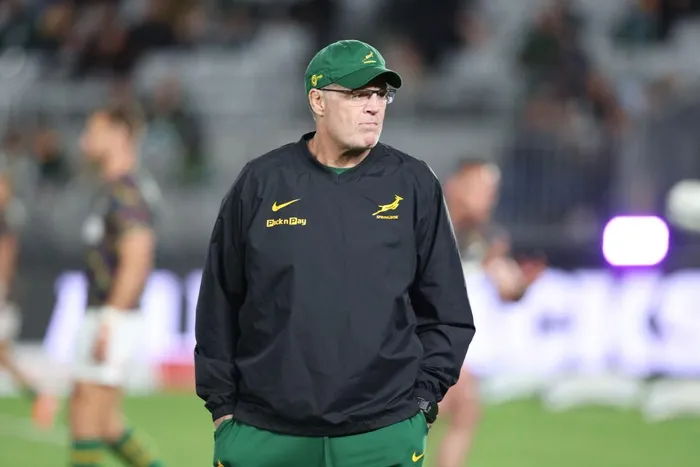
Springbok head coach Rassie Erasmus is of the opinion that a global calendar will establish more synergy in world rugby.
Image: AFP
Springbok coach Rassie Erasmus has thrown his support behind the long-standing calls for a global rugby calendar, saying it would be “fantastic” if the international windows could align with the different competitions.
Erasmus believes that moving the Rugby Championship to the same period as the Six Nations would create the kind of synergy world rugby has been striving for and would ultimately benefit both hemispheres.
With the recent announcement of Rugby’s Greatest Rivalry, a tour featuring the world champions and New Zealand, the question of a global calendar to align international matches has resurfaced. The two sides will face each other in 2026 in four Test matches, three on South African soil, while the All Blacks will also play midweek matches against the SA franchises.
The Boks will reciprocate the tour in 2030, with the Rugby Championship returning in 2027, 2028 and 2029. Erasmus welcomed the reinstating of international bilateral tours and, at the same time, shared his thoughts on having a global calendar.
“I don’t want this to be a headline; this is just my opinion, and I don’t want to go against the wishes of SA Rugby or what they are thinking,” the Springbok mentor said.
“But I think it would be fantastic if we could all play the Rugby Championship in February, when the Six Nations is on. It would be much easier to know all the teams and be aligned, rather than having some countries flat in June and others peak in November, and then we are flat at that time. “To implement law variations right across the board would be so much easier because all competition will start at the same time.”
Erasmus’s comments add weight to a debate that has stretched over a decade, with administrators, coaches, and players repeatedly calling for better alignment between the northern and southern hemispheres. Currently, the Six Nations takes place between February and March, while the Rugby Championship is staged between July and October – creating a fragmented international calendar that complicates player management and scheduling.
“In my honest opinion, I can’t see a reason why we, New Zealand, Argentina and Australia can’t play that competition at the same time as the Six Nations. I might be missing a big thing here that doesn’t make sense. But I like the idea.”
Erasmus added that the Springboks will be using the next five Test matches in Europe, scheduled to start in two weeks against Japan, to refine the team as they look towards the 2027 Rugby World Cup in Australia.
The Boks will also face France, Italy, Ireland and Wales in the November Tests, before their focus shifts to Rugby’s Greatest Rivalry next year. The world champions will use these five matches against northern opponents as a first dry run with 2027 in mind. These matches will also be crucial for their world rankings ahead of the Rugby World Cup pool draw in December.
“During the November tour, we will be facing Ireland and France, and that will maybe bring a semi-final and final feel to see if we can win the year-end tour. So, I guess let’s get through this year and maybe we can put that cap on next year and call Rugby’s Greatest Rivalry a dry run, but the tour is still a long way off.”
Rugby’s Greatest Rivalry tour fixtures 2026
August 7: Stormers v New Zealand at DHL Stadium, Cape Town
August 11: Sharks v New Zealand at Kings Park, Durban
August 15: Bulls v New Zealand at Loftus Versfeld, Pretoria
August 22: First Test – South Africa v New Zealand at Ellis Park, Johannesburg
August 25: Lions v New Zealand at Ellis Park, Johannesburg
August 29: Second Test – South Africa v New Zealand at DHL Stadium, Cape Town
September 5: Third Test – South Africa v New Zealand at FNB Stadium, Johannesburg
September 12: Fourth Test – South Africa v New Zealand (venue to be announced)
Related Topics: